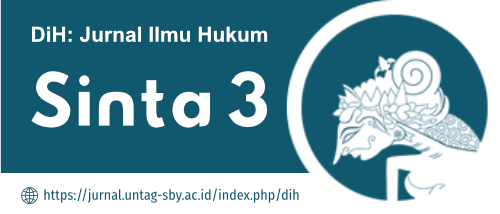TOURISM LAW (STUDY ON THE DUTCH CEMETRY IN PENELEH SURABAYA)
DOI:
https://doi.org/10.30996/dih.v15i2.2466Keywords:
tourism law, dutch cemetry, PenelehAbstract
A law is said to be good if the law goes according to its function. By all means is to implement the law in law science. The application of the law is a state characteristic of the law in which the application will be achieved legal objectives consisting of legal justice, legal certainty and legal benefit. Starting from this, the development of tourism in Indonesia, especially in the Dutch cemetry in Peneleh Surabaya does not comply with Act No. 10-2009. This development is also influenced by human resources in this case the government of Surabaya is less concerned about the existence of the Dutch cemetry in Peneleh Surabaya. By doing empirism Research, the results are still low desire of Surabaya city government because the location is not located in the city centerDownloads
References
Arifin, Samsul, ‘Makam Peneleh Surabaya, Makam Tokoh Kolonial Dari Gubernur Yang “Dilupakan†Sampai Pencipta 'Bahasa"’, 2019 <http://jatim.tribunnews.com/2019/03/17/makam-peneleh-surabaya-makam-tokoh-kolonial-dari-gubernur-yang-dilupakan-sampai-pencipta-bahasa?page=2>
At, Resolution A/RES/406 (XIII), and the thirteenth WTO General Assembly, Global Code Of Ethics For Tourism (Santiago, Chile, 1999)
B, Antariksa, Peluang Dan Tantangan Pengembangan Kepariwisataan Di Indonesia (Sumatera Barat, 2011)
Higgins-Desbiolles, Freya, ‘More than an “Industryâ€: The Forgotten Power of Tourism as a Social Force’, Tourism Management, 27 (2006), 1192–1208 <https://doi.org/10.1016/j.tourman.2005.05.020>
‘Wikipedia’, 2019 <https://id.wikipedia.org/wiki/Makam_Peneleh>
Downloads
Published
Issue
Section
License
Authors who publish with DiH: Jurnal Ilmu Hukum agree to the following terms:
- Authors transfer the copyright and grant the journal right of first publication with the work simultaneously licensed under a CC BY-SA 4.0 that allows others to share the work with an acknowledgement of the work's authorship and initial publication in this journal.
- Authors are able to enter into separate, additional contractual arrangements for the non-exclusive distribution of the journal's published version of the work (e.g., post it to an institutional repository or publish it in a book), with an acknowledgement of its initial publication in this journal.
- Authors are permitted and encouraged to post their work online (e.g., in institutional repositories or on their website) prior to and during the submission process, as it can lead to productive exchanges, as well as earlier and greater citation of published work (See The Effect of Open Access)










